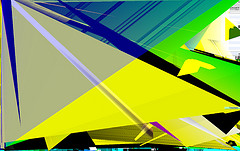 Perhaps creativity and intelligence exist in different universes. Although I have had kind words to say about AGI (Artificial General Intelligence), I sometimes despair. A new free online service, LifeNaut, allows you to build "mindfiles" to preserve your essential unique qualities. By this, they mean your videos, photos, documents, maps of your trips. Can anyone really think that this is their "mind"? Your exact physical location when reading this blog is unique, totally and absolutely—but does it capture your uniqueness? This outfit has created a robot that acquires new experiences and knowledge by interacting with videocams and voice-recognition software. Frankly, I feel embarrassed on behalf of humanity.
Perhaps creativity and intelligence exist in different universes. Although I have had kind words to say about AGI (Artificial General Intelligence), I sometimes despair. A new free online service, LifeNaut, allows you to build "mindfiles" to preserve your essential unique qualities. By this, they mean your videos, photos, documents, maps of your trips. Can anyone really think that this is their "mind"? Your exact physical location when reading this blog is unique, totally and absolutely—but does it capture your uniqueness? This outfit has created a robot that acquires new experiences and knowledge by interacting with videocams and voice-recognition software. Frankly, I feel embarrassed on behalf of humanity.
The crucial issue for these AGI researchers and their brilliant leader, Ray Kurzweil, seems to lie in their perception of intelligence as knowledge. There is nothing wrong with intelligence or knowledge, but they are limited. Have these people heard of conjectures? understanding? even wisdom? Do these play any role in choices? Not if you watch our statesmen—but they are things apart. Academics hold all explanations as tentative theories and rule out wisdom as well. But even they have to understand what they are doing and what their experiments and theories mean.
But look at yourself and your friends: I trust you see some wisdom there. What about compassion? How does knowledge produce compassion? What is the role of data in inner strength and character? The only role I can see is in creating AI systems that will use data and information to crush the human spirit. Why not? When the technological singularity arrives and they are in charge, what would inhibit them? They could no more notice the human spirit than we notice the concerns of bacteria on our desk.
In this religion of technology, the quintessential human elements are being omitted.
Now, that is not a bad thing for a computer. And I am a great supporter of computer technology. But to say that a computer (or robot) is, or can emulate, a human being is to say that a jumbo jet emulates a bird. It doesn't. A bird flies under its own energy; a jumbo-jet flies under its own energy (or is that the earth's energy?). But a bird does a lot more … it lays eggs for a start. I can't see jumbos laying eggs anytime soon. You may say: who needs jumbos to lay eggs? But are you ready to say: who needs computer-based choices to display wisdom? to reveal compassion? to consider justice?
Aeroplanes are extremely useful but let's not pretend they are what they are not. The same rule should apply to computers. They offer vast information storage, and ever faster processing. That means computers can handle our specific information collecting, processing and storing tasks … let them. Of course if, like the sorcerer's apprentice, we don't know what we are doing, which is mostly the case, then it can get out of control. We are currently deluged with more information than we ever dreamed we wanted, and the flood shows no signs of diminishing. Still, computers designed by us should solve the information management and retrieval issue. I am a technology optimist and believe they will.
But remember: this solution has nothing to do with being human. Our memory was never designed to be a Rolodex: it has far more important functions. A computer, by contrast, can look at a Rolodex as you do a frog … it's just a vastly less evolved version of itself.
Each of us, as a human being, is characterized by our willingness and our creativity. You have the option at any moment to make choices that are harmful for yourself or for another or both—or to refrain from doing so. In difficult situations where the greatest challenges lie, your sense of goodness is needed and your creativity is crucial. When we fully understand willingness and creativity, virtue and freedom, then we can look again at intelligence and what computers can and can't do.
For now let's not pretend.
What do you think? Am I being a Luddite here? Tell me
WK
About
Warren Kinston